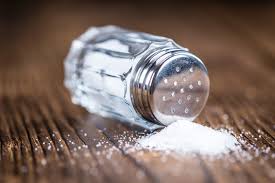
FG unveils guideline on salt intake to tackle hypertension
To address the increasing prevalence of hypertension among Nigerians, the Federal Government has introduced the National Guideline for Sodium Reduction, aimed at mitigating the negative health effects associated with high sodium consumption.
During the launch event in Abuja on Wednesday, Dr. Iziaq Salako, the Minister of State for Health and Social Welfare, emphasized the importance of this guideline, noting that studies indicate the average salt intake in Nigeria significantly surpasses the limits recommended by the World Health Organization.
Represented by Olubunmi Aribeana, the Director of the Food and Drug Services Department at the ministry, Salako pointed out that the excessive intake of sodium is closely linked to the concerning rise in hypertension, which currently affects over 35 percent of the adult population in Nigeria.
He also addressed the influence of urbanization on eating habits, highlighting the growing preference for processed and packaged foods, which introduce new public health challenges, particularly the increasing incidence of cardiovascular diseases associated with high sodium levels.
“The situation is particularly severe in urban areas, where dietary choices often favor saltier meals, inadvertently jeopardizing our health with habits that could lead to serious long-term consequences,” he remarked.
With a sense of pride and a commitment to public health, he announced the launch of the National Guideline for Sodium Reduction, describing it as a meticulously developed framework that reflects our shared resolve to combat the health risks of excessive sodium intake.
The minister characterized this guideline as a pioneering initiative in Africa, referring to it as a dynamic manifesto for change that aligns global health recommendations with the specific needs of Nigeria.
He further clarified that the guideline sets explicit limits on sodium levels in processed and packaged foods, ensuring compliance with international health standards, supported by the WHO.
He also advocated for public education and changes in behavior, highlighting that the strategy utilizes mass media, social media, and grassroots initiatives to raise awareness about the risks associated with high sodium intake and to promote healthier eating habits.
The minister further presented the National Guideline for Food Handlers’ Medical Test, characterizing it as an essential step to protect the integrity of the nation’s food supply chain.
He stressed that the guideline creates a standardized protocol for the regular medical evaluation of food handlers, ensuring uniformity and enhancing public health safeguards.
“Collectively, these guidelines create a comprehensive framework that directly supports the execution of the National Policy on Food Safety and Quality and its Implementation Plan for 2023,” he stated.
“By tackling both personal health awareness and overarching food safety regulations, we are cultivating a coordinated strategy to achieve safer, healthier, and more dependable food practices throughout the country.”
In her comments, the Director of the Food and Drug Services Department at the ministry, Olubunmi Aribeana, noted that excessive sodium intake presents significant threats to public health, with its harmful effects being well-established.
Aribeana, represented by the Director of the Food, Cosmetic, Chemicals, and Water Safety Division at the ministry, Olufunmilola Yusuf, indicated that high sodium consumption is a significant factor in cardiovascular diseases, which rank among the top causes of death linked to non-communicable diseases.
“Alarmingly, the WHO indicates that non-communicable diseases account for over 70 percent of global fatalities. In this light, the Department of Food and Drug Services is firmly dedicated to promoting healthier eating habits and decreasing sodium intake across the nation,” she remarked.
Akinbode Oluwafemi, the Executive Director of Corporate Accountability and Public Participation Africa, emphasized that the successful execution of the guideline will significantly contribute to lowering excessive sodium consumption and decreasing the incidence of cardiovascular diseases and non-communicable diseases (NCDs).
"Today signifies another important achievement in protecting public health in Nigeria by advocating for a nutritious diet.
"We are dedicated to our collaboration with the ministry and its agencies to promote policies that foster positive health outcomes."
In her message of goodwill, Mojisola Adeyeye, the Director General of the National Agency for Food and Drug Administration and Control, remarked that this significant event reflects Nigeria’s steadfast commitment to addressing the rising challenge of NCDs, especially hypertension and cardiovascular diseases.
Speaking on her behalf, Kayode Fagboyo, the Director of the Food Registration and Regulatory Directorate, stated, "As the agency tasked with ensuring food safety and public health, NAFDAC is devoted to facilitating the effective implementation of this guideline.
"Our regulatory oversight will guarantee adherence to sodium reduction goals, transparent labeling of sodium levels in pre-packaged food items, and ongoing collaboration with the food industry to encourage healthier sodium alternatives."
Dr. Adeolu Adebiyi, Senior Advisor for the Africa Food Policy Programme at Global Health Advocacy Incubator, highlighted that the guideline will play a crucial role in tackling the increasing burden of NCDs.
He underscored the importance of regulating salt consumption to reverse current trends and enhance public health, underscoring the significance of the government's ongoing initiatives.





